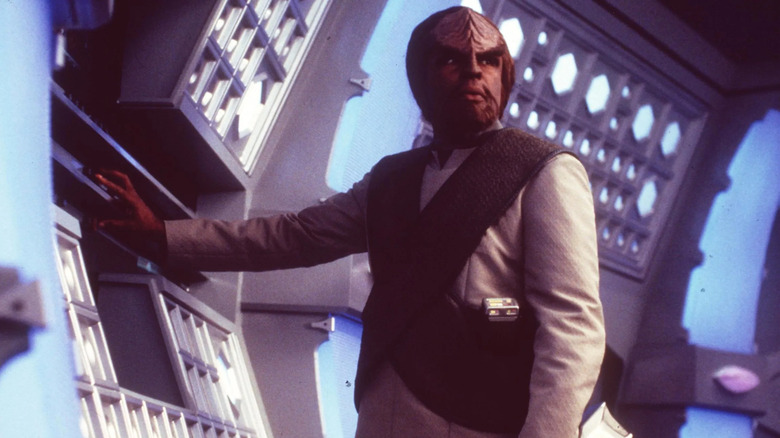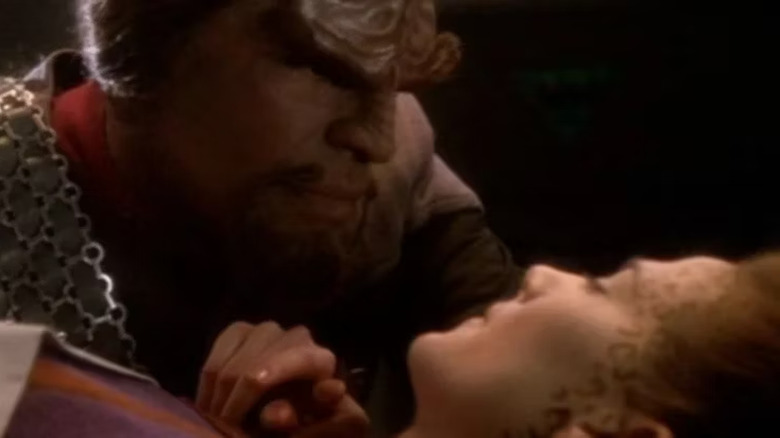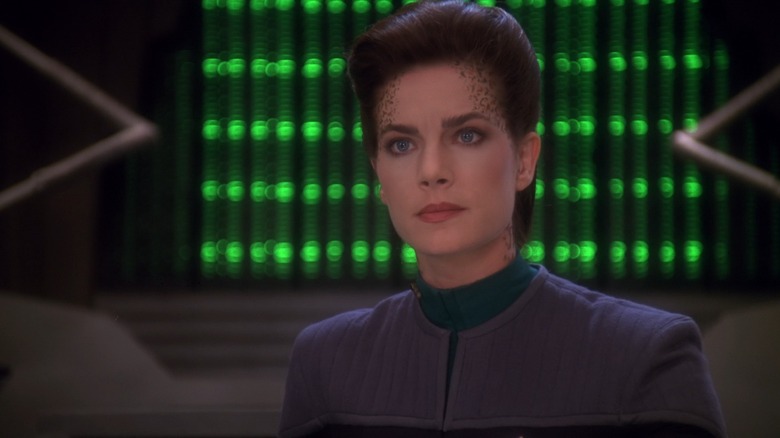Why The Star Trek The Next Generation Movies Ignored Two Major DS9 Plot Points
"Star Trek" fans really had it all in the mid-1990s. The "Star Trek: The Next Generation" movies carried on the adventures of the Enterprise at the cinemas, while "Star Trek: Deep Space Nine" and "Star Trek: Voyager" told new stories of Starfleet on the television each week. It was truly an amazing time to be a "Star Trek" fan, although occasionally it could feel like "The Next Generation" got preferential treatment above the other two series. That was especially true when it came to how the events of "Deep Space Nine" were depicted (or really, weren't depicted) in the "Next Generation" movies.
You see, the events of "Star Trek: First Contact" and "Star Trek: Insurrection" take place right before and during the Dominion War, which is the main arc of the final few seasons of "Star Trek: Deep Space Nine." Lieutenant Commander Worf (Michael Dorn) went from serving on the Enterprise to the space station Deep Space Nine when "The Next Generation" went off the air, but he did return to the fold in both films, even captaining the Defiant during a battle with the Borg in "First Contact." As cool as it was to see the Defiant, the cool new ship from "Deep Space Nine," in action on the big screen, it was frustrating that nothing about Worf's time on the space station was discussed, including his marriage and the tragic death of his wife, Jadzia Dax (Terry Farrell). So what gives?
Why Insurrection ignored major Deep Space Nine subplots
In the unpublished behind-the-scenes book "Fade In: From Idea to Final Draft — The Writing of Star Trek: Insurrection" by the film's screenwriter, Michael Piller, he explains that originally there was at least a nod to the deceased Trill. On "Deep Space Nine," Jadzia was murdered by Cardassian leader Gul Dukat (Marc Alaimo) when Terry Farrell left the show in season 6 due to feeling exhausted by the shooting schedule and allegedly having disagreements with writer and producer Rick Berman.
Piller shared that originally he had planned to include a line in the film where Captain Jean-Luc Picard (Patrick Stewart) gives his condolences to Worf, who is still in mourning over the loss of his wife, but he was stopped by Berman.All of this is part of the overall "Deep Space Nine" arc surrounding the Dominion War, which was pretty controversial among "Star Trek" writers because Roddenberry never intended for "Star Trek" to deal with the murky ethics of war, another Berman sticking point.
In "Fade In," Piller reveals that it was Berman who shot down the idea of mentioning the Dominion War or Jadzia at all:
"Rick ultimately decided that it would be confusing to audience members who were not regular viewers of 'Deep Space Nine' so we ignored the death of Worfʼs wife."
While Piller felt that it would have been "nice to be consistent with the TV show," in the end it just wasn't meant to be, and fans of "Deep Space Nine" had to just be content to see Worf on the big screen at all. For Jadzia fans, however, the revelation that Berman was the one who nixed any mention of her is infuriating.;
Jadzia and Farrell deserved better
In the book "The Fifty-Year Mission: The Next 25 Years: From The Next Generation to J. J. Abrams," edited by Mark A. Altman and Edward Gross, Farrell discussed her difficulties with Berman, whom she said was "very misogynistic." She said he would comment on things like "your bra size not being voluptuous" and tell her she should have a chest more like his busty secretary, which is just awful. When you stack that kind of treatment on top of the breakneck shooting schedules from the days when a television season consisted of 26 hour-long episodes, it's really no wonder that she needed to take a small step back. Farrell allegedly wanted to just have less of a role on the show and never wanted Jadzia to die, and to add insult to injury, she was "replaced" when the symbiont Dax was put into a new host, Ezri (Nicole de Boer), for the show's final season.
Despite Berman's frustrating attempts to make Jadzia disappear from "Star Trek" entirely and the way "Deep Space Nine" was often seen as the unwanted black sheep of the franchise, Jadzia and the series' legacy is still vital for a lot of fans. The character was incredibly important to me as a young queer person learning to love myself, and "Deep Space Nine" has become appreciated by more and more fans as the best "Star Trek" show of them all. In the end, Berman's decision was the wrong one, but it didn't matter because "Deep Space Nine" stood on its own just fine without needing crossover in the "Next Gen" films.


